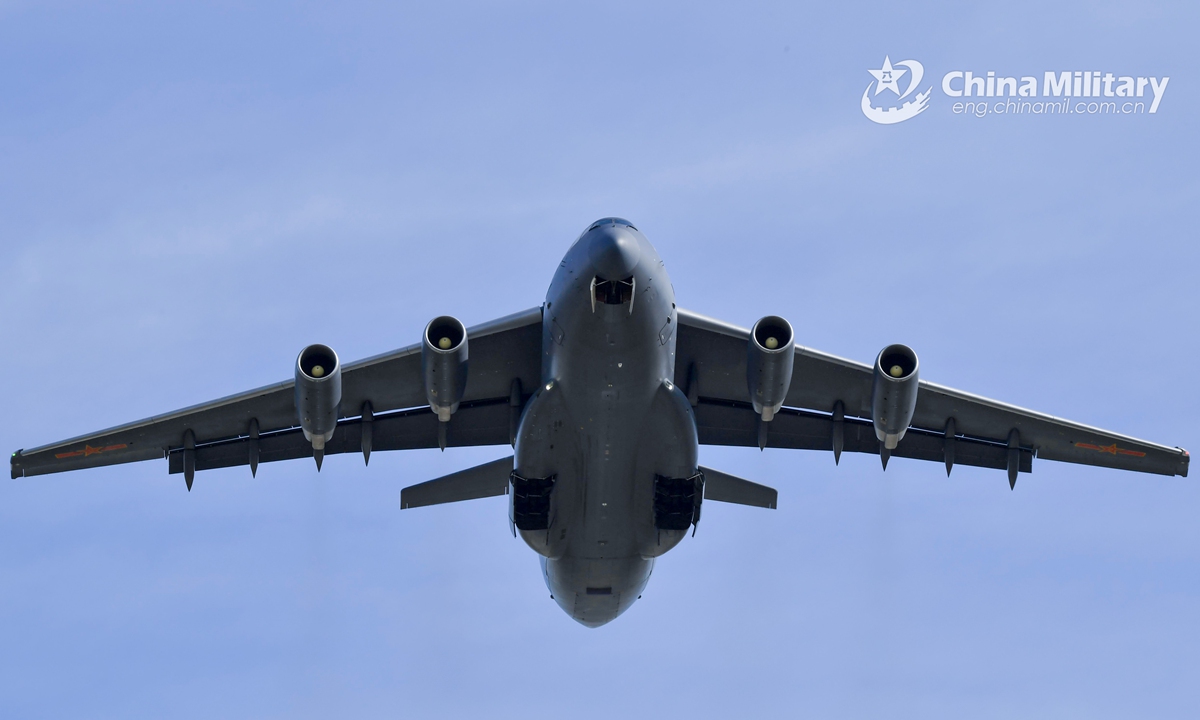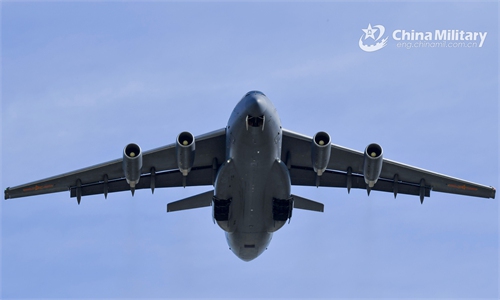West hypes air force 'intrusion' to sow discords in S.China Sea

A Y-20 large transport aircraft attached to an aviation division under the PLA Western Theater Command flies at a predetermined altitude during a flight training mission on January 4, 2021. (eng.chianmil.com.cn/Photo by Liu Shu)
The foreign ministry of Malaysia on Tuesday said it would summon China's envoy to explain an "intrusion" by 16 aircraft dispatched by the Chinese People's Liberation Army Air Force into Malaysia's airspace, according to a Reuters report on Wednesday. Malaysia's air force called the incident a "serious threat to national sovereignty and flight safety."However, Chinese Foreign Ministry spokesperson Wang Wenbin on Wednesday refuted these accusations at a regular press conference, responding that the Chinese Air Force held a routine training operation in southern Nansha Islands in the South China Sea. Wang said the training did not target any country, and the Chinese Air Force strictly abided by international law without entering the airspace of other countries.
In response to the incident, some Western public opinion has taken the opportunity to hype and exaggerate China's so-called security threats, trying to provoke China-Malaysia disputes. For example, one Western scholar commended on Twitter that this is "a preview of what would happen if the US were to withdraw from the West Pacific."
In the Asia-Pacific region, it seems that any bilateral issue between China and other countries will be magnified by the US. It will then be turned into an excuse for Washington to strengthen its military presence in the region.
Obviously, the 16 Chinese Air Force aircraft abided by international law and the routine flight training has nothing to do with "intrusion." Although China and Malaysia have overlapping territorial claims, these disputes are within the scope of the two countries' bilateral relations. They should not be exaggerated. Those who are sensationalizing this issue are clearly trying to find an excuse to disrupt the regional situation and expand the US' military presence.
Also, the US government-funded news service Radio Free Asia quoted Collin Koh, a Singapore-based maritime security analyst, to criticize the action by the Chinese air force "is not only a blatant intimidation against Malaysia, but also predatory and opportunistic."
Such an accusation is completely baseless as well. China-Malaysia relations have always been in a relatively good and stable state. For example, on May 21, Chinese Premier Li Keqiang had a video conference with Malaysian Prime Minister Muhyiddin Yassin. During the conference, they exchanged in-depth views on China-Malaysia relations and cooperation, as well as international cooperation in the fight against COVID-19.
There is no "intimidation" between China and Malaysia. We believe this incident will eventually be resolved peacefully through diplomatic means. However, some media from the US and other Western countries have been hyping the so-called China threat theory regarding this incident. Obviously, their real intention is to draw a wedge between China and Malaysia and continue to undermine regional peace and stability.
The US claims to be an important force in maintaining peace and stability in the Asia-Pacific region. Yet not every regional country wants Washington to enhance its military presence. In fact, the US is one of the reasons why tensions in the South China Sea keep intensifying, as Washington promotes so-called freedom of navigation in the region and constantly conducts military exercises with its allies.
The US is one of the factors contributing to Asia-Pacific regional instability, not China. This is contrary to what some Western public opinion has hyped. China has never used its military strength to invade other countries. Indeed, China strengthens its military only to promote peace and stability, and countries like the US need to get used to China's growing military power.
Western media have been inflaming anti-China sentiments and speculating about the so-called China threat theory. By disguising Washington as the defender of regional security, the media in the West are nakedly attempting to make these nations tilt completely toward Washington. But this is just an illusion. It is in diametrical opposition to the current reality of international politics.
As for China, it needs to strengthen its cooperation with regional countries, including Malaysia. It also needs to increase military exchanges and mutual trust between Beijing and Kuala Lumpur. This will prevent US agitations from affecting bilateral relations between the two.
The author is director of the Center for Southeast Asian Studies at the Chinese Academy of Social Sciences in Beijing. opinion@globaltimes.com.cn



